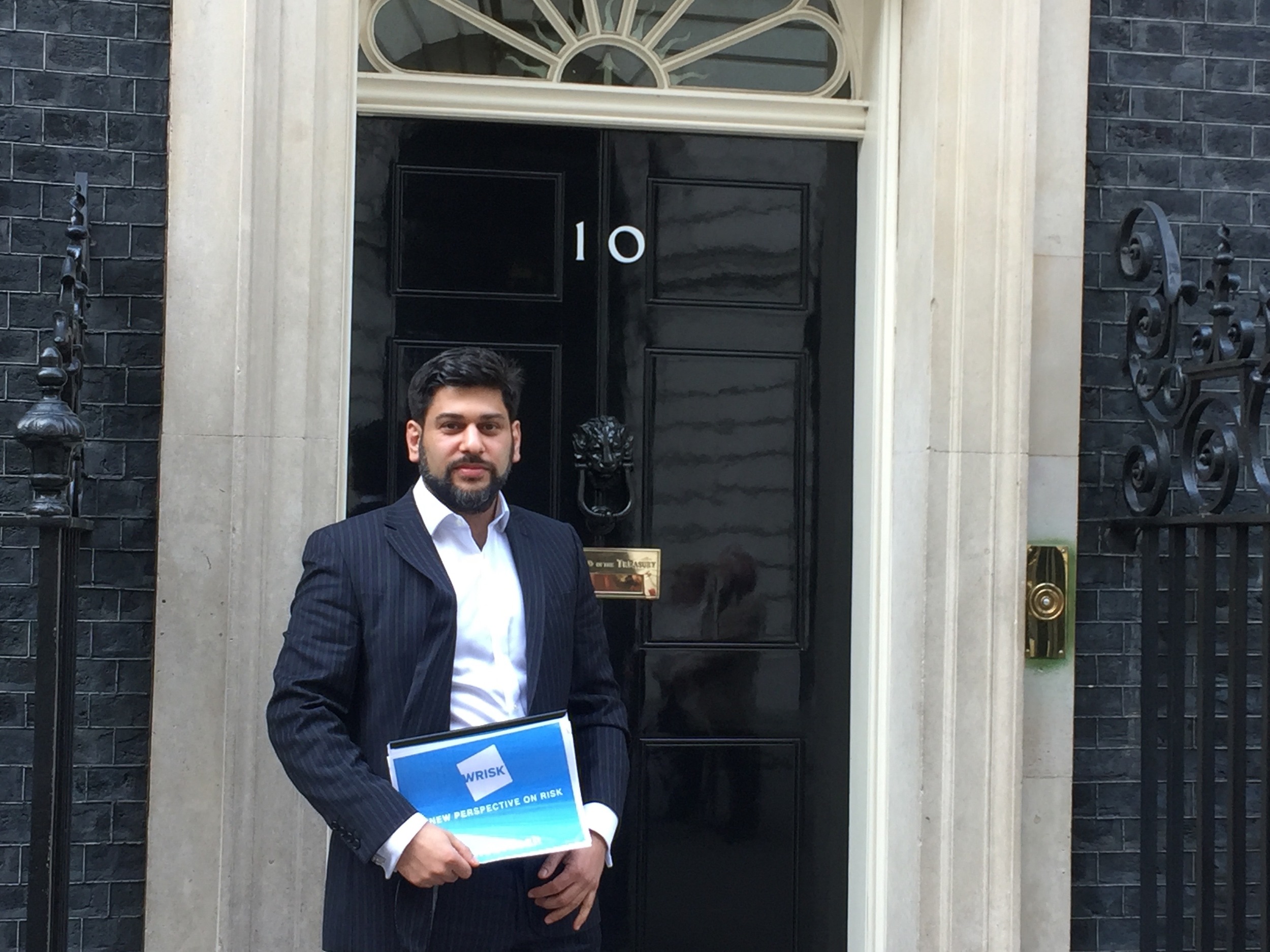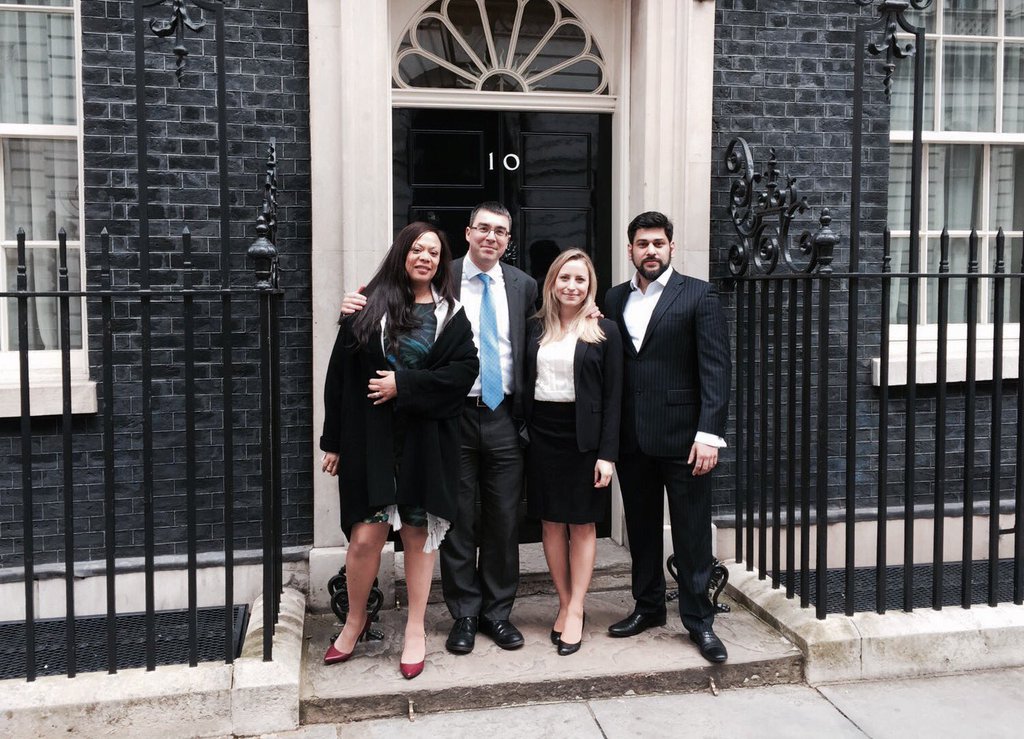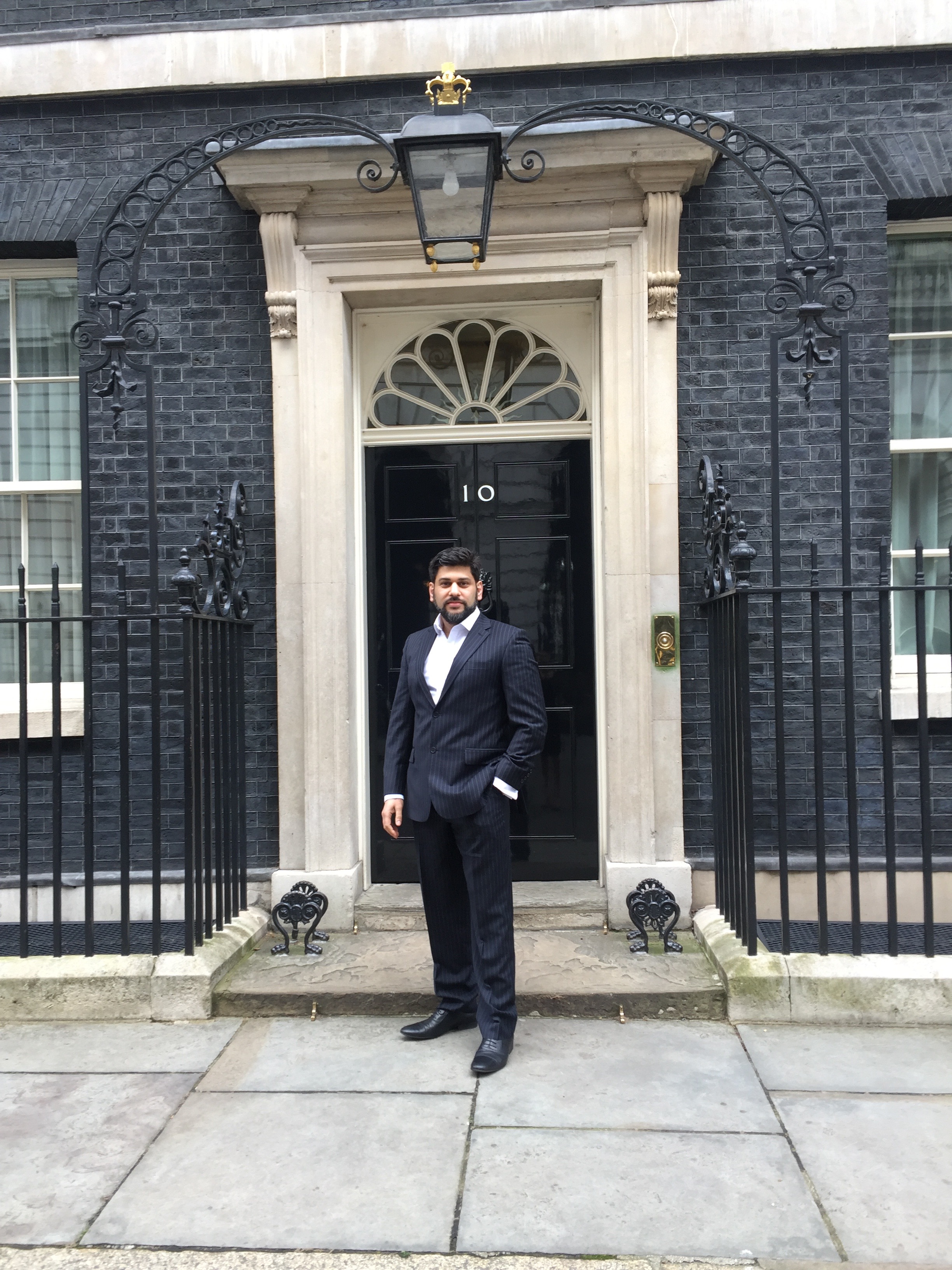Working in a start-up can be crazy. On a good day you feel like Elon Musk ( see footnote *) ; nothing is impossible; your idea will change the world! On a bad day you wonder how you are going to pay the rent and why you ever left the comparative comfort of life in a big corporate.
The 30th March 2016 was a good day… and also just a little bit surreal.
Thanks to the friendly efforts of the #insurtech community, we were invited to a rather special round table… Except it wasn’t a round-table.
The State Dining Room at 10 Downing Street
It was a long rectangular table in a rather more spectacular room than we usually get to sit at…
This is the State Dining Room at Number 10 Downing Street! We’d been invited to attend to discuss the major changes coming to the insurance industry - and which Wrisk intends to be a big part of...
Arriving at Downing Street
Security was tight
Enquiring of the PM’s private office whether the start-up attire of jeans and t-shirt were OK, brought back a request for “business-attire”. Hmm. Thankfully, despite recent easter chocolate intake, I squeezed into my one suit.
It was a strange experience to fight my way through the crowd of tourists to inform one of the several armed policemen of my 2pm appointment. I caught myself briefly thinking that my feeble attempt at a “hipster beard” might bring about undue scrutiny, but I was ushered through.
Downing Street itself behind the gates, the street was eerily quiet. We enjoyed taking photos of each other by the famous door. At one point our impromptu photo-shoot was interrupted as the door opened to reveal… Larry (the PM’s cat and Chief Mouser to the Cabinet Office!).
Larry looked at us disapprovingly and stalked away.




OK. That’s the fun bit. What on earth was I - a digital technology evangelist running a start-up - doing invited to Number 10?
The Question...
Daniel Korski (Deputy Head of the Policy Unit in the Prime Minister’s Office) was trying to answer a question. Tech City UK had helped gather together diverse group of people to try and shed some light on the issue.
The group included insurers/brokers ranging from the large incumbents (AIG, Aviva), new entrants (Bought By Many, Marmalade, Guevara, Buzzmove) and fresh start-ups - amongst these, Wrisk featured proudly alongside Cuvva, Brolly and Digital Risks. There were also representatives from tech companies such as Everledger and Sweatcoin, solution providers such as The Floow, Autoemo, Charles Taylor and Analyze Re and, of course, friends from Startupbootcamp InsurTech, InsTech London and Tech City UK.
Daniel’s question around #insurtech, which he posed as he kicked-off the 90 minute session was:
“Why is there only a trickle when there should be a flood?”
If market sentiment is to be believed, there are massive opportunities in the #insurtech space. The predictors all point to a massive and as yet untapped opportunity for #insurtech. Investors are on the prowl and incumbents are waking up to potential change. Startups are appearing, embracing new technology and business models.
Yet… although the signals point to a flood of disruption - the observable effect thus far is only a trickle. Why?
There are high barriers to entry for new startups trying to break into the insurance space. I have highlighted a few of these impediments below:
Culture
It is incredibly hard to set up an insurance carrier from scratch. Someone commented upon a recent dialogue with the FCA where they mentioned that 25 applications for new challenger banks were received last year. Apparently, when they asked about the last time someone wanted to set up a new insurance carrier, the FCA representative had to check their records and found it was Admiral back in 1993!
As a consequence, rather than starting a carrier from scratch, startups often want to partner with forward-thinking established insurance carriers to bring their ideas to market more quickly. Culture within incumbent carriers can often be an impediment. Insurers naturally try to quantify and mitigate risk in advance before making firm commitments. Conversely, startups hone in on ideas that work through ongoing experimentation. The approaches are so very different that progress through partnership can become stagnated.
It’s one reason, incidentally, why Wrisk is being very selective about who it wants to partner with and how that partnership should work.
If you’re an insurer who wants to explore this further - do get in touch with me directly.
Regulation and Policy
Image - "How the ‘wonks’ of public policy and the ‘geeks’ of tech can get together" - TechCrunch 17/03/16
Insurance is a highly regulated space. Again this can often lead to the progress of startups being hampered. Regulation (especially after the crash) is an essential part of any financial services offering.
But again, there is a natural tension in the approach of regulators compared to startups.
The good news was that it came over loud and clear during the round table that the channels of communication are open! Freddie from Cuvva shared a few examples. It will be great to see change or progress on some of these soon.
If you are a #fintech or #insurtech startup who feels they are being unwittingly hampered by some piece of antiquated legislation – get in touch with the FCA, the PRA and/or Daniel directly. These folks want to help.
ARTIFICIAL INTELLIGENCE AND REGULATION
Following on from some wider points that Aldo Monteforte from The Floow made on the impact of technology on regulation, I brought up the point that regulators must evolve to become more tolerant of decisions made through AI. This view was also supported by Reza Khorshidi from the Quantitative Analytics and Special Projects Lab at AIG.
If we embrace artificial intelligence to help inform decisions (e.g. whether or not to pay a claim, when to refer, whether we suspect fraudulent behaviour or how a set of attributes correlates into risk scoring) then we may not always be able to explain to regulators EXACTLY WHY a particular decision is reached (in the sense of a pre-agreed mapped out set of algorithmic steps that lead to a decision).
Google's AlphaGo defeats Lee Sedol. What AlphaGo's Win Means for Your Job (Fortune Magazine 21/03/16)
We will be able to show the training datasets, that decisions are consistent and reliable. But as AI in financial services decision-making becomes more prevalent, Audit/Regulation cannot expect a flow-chart like explanation of the decision-making process.
We cannot explain exactly what “AlphaGo” was thinking when it beat Lee Sedol in the historic Go match in March 2016 - but we know from the outcome that those decisions were effective.
Thankfully, by its very nature, #insurtech is designed to accomplish much of what regulators desire: it thrives on disintermediating low-value-add players, it fosters open communication, and it runs on a low-cost infrastructure and thereby minimises service delivery costs. It promotes transparency via social media and other platforms, and it seeks to grow the market by increasing the number of participants in the market, thereby supporting financial inclusion.
We therefore need to ensure ongoing collaboration between regulators and the InsurTech community. #Regtech is also becoming “a thing”.
Cycle-Time
As far as impediments to innovation in insurance go there was a point raised by Kim Miller (Guevara) that I found fascinating.
He mentioned that with #fintech, things were based around “payments”. Payments tend to be high in both volume and frequency. They work on a tight cycle-time and are thus perfect constructs for technology facilitated innovation through experimentation. With #insurtech, things tend to be based around “claims”. Claims have a much lower frequency and much longer cycle-times. It can often take several years before trends in claims become apparent and you can see significant trends in historic data. As a consequence it is much harder to construct experiments around new insurance business models which will give you fast feedback. These long cycle-times also make investors nervous as it may take several years before they can adequately assess the success of new propositions.
Scratching the surface
These were just a few highlights of the points touched on in what was a very enlightening 90 minutes. Naturally with limited time, we could only scratch the surface of what proved to be a very diverse range of issues.
We talked about trust, privacy, the changing needs of next generation customers, IoT and telemetry. We discussed the role of the FCA and PRA, sentiment around Tax as well as the challenges of acquiring and retaining technical talent.
“Me2B” and the “API of me” were also mentioned (approaches that Wrisk has already been actively exploring for data ownership in the pursuit of engendering trust with the connected generation.)
I feel privileged to have taken part in what I feel was an excellent conversation starter.
Paolo Cuomo summarised the event well in his recent blogpost :
“Ideas were shared, networks were grown, one or two policy/regulatory changes might result. All in all a very valuable hour and a half for the insurance industry.”
Thanks to Daniel Korski for hosting what I hope will be the first of many great sessions.
Thanks also to Gerard Grech, Eileen Burbridge and Kristina Tauchmannova from Tech City UK for bringing the group together. A final special thanks also to Rod Banner for helping introducing Wrisk into the group.
It was a very good day.
Tomorrow I’m looking forward to turning talk into action with the team at Wrisk.
* Back in 2016 when I started Wrisk, I held Elon in high regard. Unfortunately now, despite his ability to push the innovation agenda. I can’t endorse or align with him on a moral standpoint. (Don’t put your hero’s on pedestals folks!)
About the Author:
Darius Kumana is CEO and Co-Founder of Wrisk. You should follow him on twitter @dariuskumana
Wrisk is an #insurtech start-up providing the connected generation with a new perspective on risk. Visit www.wrisk.co, find us on LinkedIN or follow @WriskHQ on twitter.



